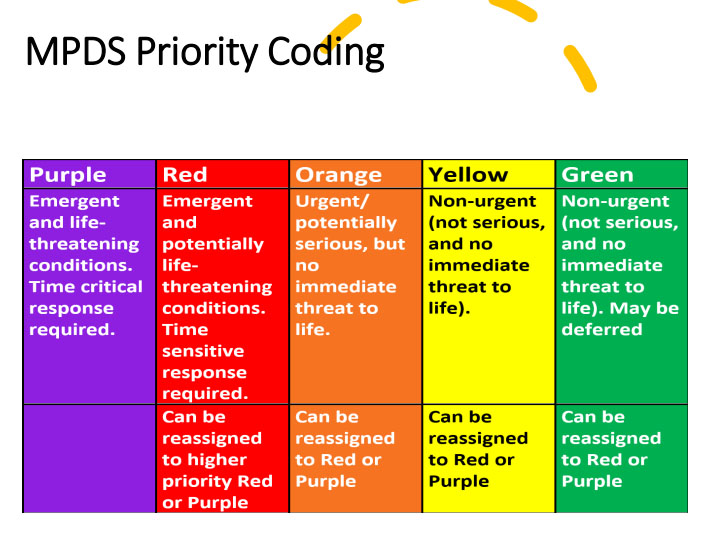A new dispatching system will soon take effect for paramedics in the United Counties of Prescott and Russell (UCPR), Stormont, Dundas, and Glengarry-Cornwall.
Starting on April 10, the two emergency services departments will use the Medical Priority Dispatch System (the “MPDS”). With this system, residents calling 9-1-1 can expect greater security and efficiency.
Developed in the 1970s, the tried-and-tested technology continues to be the subject of ongoing testing, development, and quality assurance measures. The protocol is designed to help dispatchers of the Ottawa Central Ambulance Communications Centre better understand the emergency level of a patient and triage them accordingly. Consequently, when a dispatcher receives a 9-1-1 call, the system matches available paramedic resources to a person’s medical condition, ensuring that patients in life-threatening situations receive immediate care.
MPDS uses a five-level colour-coded scale to determine the severity of a situation and what level of response is necessary. Green is the lowest, non-urgent level which may allow responses to be deferred. Yellow is also non-urgent with no immediate threat to life. Orange is urgent and potentially serious but with no immediate threat to life. Red is an emergent and potentially life-threatening condition requiring a time-sensitive response. Purple is an emergent and life-threatening condition where a time-critical response is necessary.
UCPR Deputy Chief of Emergency Services Patrick Quesnel presented the details of the MPDS system to UCPR council on Wednesday, March 27. He explained how the MPDS protocol gathers precise information regarding a patient’s condition and situation, prioritizes the most critical and urgent calls, and reduces the need to send paramedics with lights and sirens to non-urgent situations.
Quesnel explained MPDS will not affect the tiered response protocol the UCPR and local fire departments currently have which determines which service responds based on the level of attention needed to the situation. He noted the adoption of MPDS will also make it less likely UCPR paramedics will have to respond to as many calls in the neighbouring City of Ottawa or Stormont, Dundas, and Glengarry, which has been an issue for several years. MPDS prioritizes the most serious medical calls.
According to Quesnel, the current dispatch protocol depletes communities of valuable paramedic resources. He said MPDS optimizes paramedic resources for high priority calls and the right care at the right time.
“Dispatchers and paramedics work closely together to ensure efficient call management. When a medical situation is urgent, a person must call 9-1-1 immediately. Otherwise, we ask residents to consider what other resources are available near them, and whether their situation really requires paramedic assistance. Let us work together for the well-being of our community,” said UCPR Director of Emergency Services Marc-André Périard.
The Medical Priority Dispatch System will be deployed at the same time in the United Counties of Prescott and Russell, the United Counties of Stormont, Dundas and Glengarry, and the City of Ottawa. The use of this new system is one of the strategies of A Plan for Connected and Convenient Care of the Government of Ontario.


